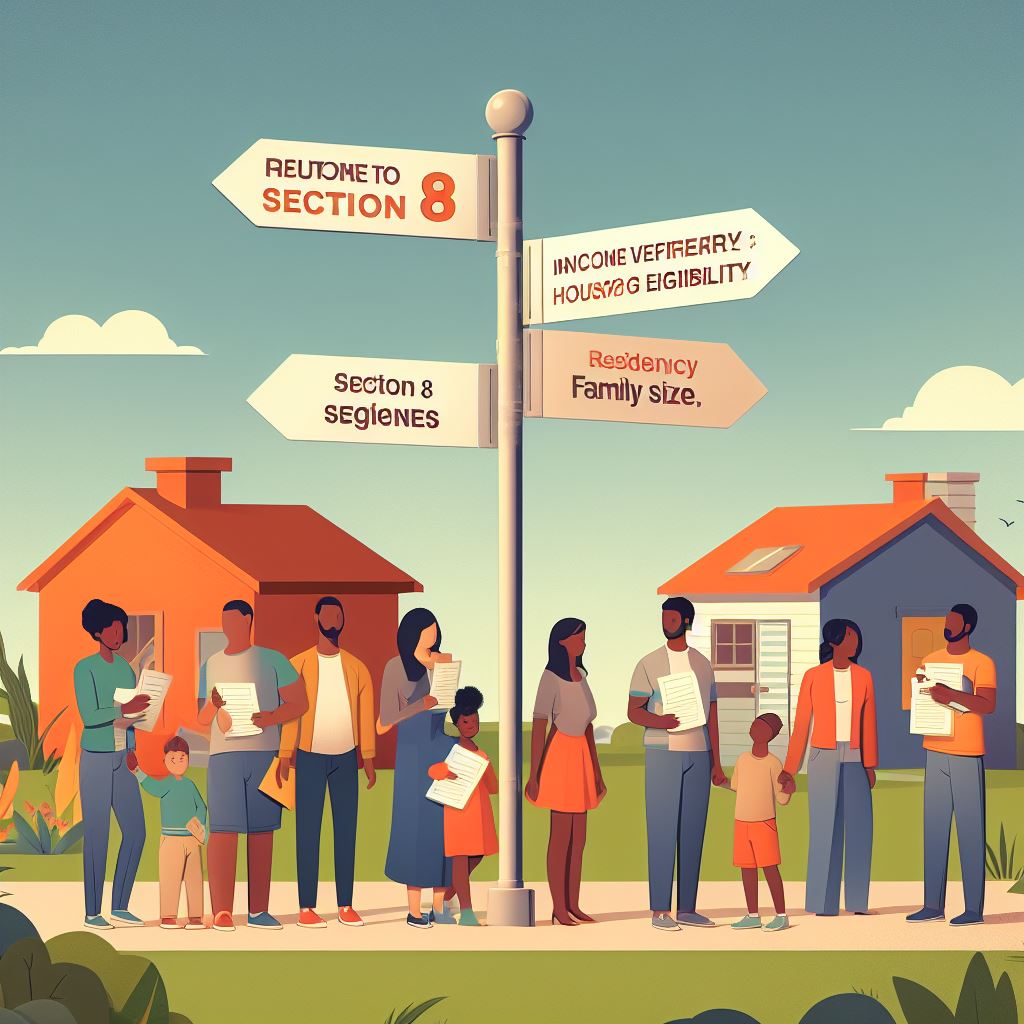Journey Through Section 8 Housing Eligibility Criteria

Are you ready to embark on a journey through the maze-like world of Section 8 housing eligibility? Strap in and get ready to navigate the income limits, household size requirements, and citizenship criteria that determine your eligibility.
But don’t forget about the all-important criminal background check and specific group requirements.
This article will be your trusty guide, providing a thorough and detail-oriented exploration of the ins and outs of Section 8 housing eligibility criteria.
Let’s dive in!
Key Takeaways
- Income limits vary based on area and household size, with a general rule that income cannot exceed 50% of the median income for the area.
- All sources of income must be considered, and documentation must be provided to support income calculations.
- The number of people in a household affects the assistance amount, with larger households potentially having higher income limits and subsidies.
- Eligibility for Section 8 housing requires U.S. citizenship or eligible immigration status, and proof of citizenship or immigration status is required.
Income Limits
To determine if you qualify for Section 8 housing, your income must fall within specific limits. The income limits for Section 8 housing vary depending on the area you live in and the size of your household. The U.S. Department of Housing and Urban Development (HUD) sets these limits each year, taking into account the median income of the area and the number of people in your household.
Generally, your income can’t exceed 50% of the median income for your area to qualify for Section 8 housing. However, some areas may have higher or lower income limits, so it’s important to check with your local Public Housing Agency (PHA) for the exact limits in your area.
It’s crucial to accurately calculate your income to determine if you meet the Section 8 income limits. This includes all sources of income, such as wages, tips, pensions, Social Security benefits, and any other benefits you receive. Additionally, any income from assets or investments may also be considered. It’s essential to provide all necessary documentation to the PHA to support your income calculations.
Understanding the income limits is just the first step in determining your eligibility for Section 8 housing. The next section will delve into the importance of household size in the application process.
Household Size
Consider the number of people in your household when determining your eligibility for Section 8 housing. The size of your household plays a crucial role in determining the amount of assistance you may qualify for. When applying for Section 8, you’ll need to provide accurate information about all the individuals who’ll be living with you in your new home.
To determine your household size, include yourself, your spouse, any children or stepchildren, and any other individuals who’ll be living with you on a regular basis. This includes elderly parents, siblings, or other relatives. It’s important to note that foster children, as well as individuals who aren’t related to you, may also be included in your household size, depending on the specific circumstances.
The size of your household will affect the calculation of the total income limit and the maximum subsidy you may receive. Generally, the larger your household, the higher the income limit and subsidy will be. However, it’s important to understand that each housing authority may have different guidelines and calculations for determining eligibility based on household size.
Citizenship Requirements
Make sure you meet the citizenship requirements when applying for Section 8 housing, as it’s essential to qualify for assistance. To be eligible for Section 8 housing, you must be a U.S. citizen or have eligible immigration status. This means that you must either be a U.S. citizen, a U.S. national, or have eligible immigration status, such as being a lawful permanent resident or having refugee or asylum status. Proof of citizenship or immigration status will be required during the application process.
If you’re a non-U.S. citizen, you may still qualify for Section 8 housing if you have eligible immigration status. However, it’s important to note that certain immigration statuses may have limitations or restrictions on eligibility. For example, individuals with temporary or non-immigrant visas may not be eligible for Section 8 housing. It’s important to consult the specific eligibility requirements and guidelines provided by the local Public Housing Agency (PHA) or the U.S. Department of Housing and Urban Development (HUD) to determine if you meet the citizenship requirements for Section 8 housing.
Criminal Background Check
Before submitting your application for Section 8 housing, the background check will assess your criminal history. This is an important step in the eligibility process as it ensures the safety and well-being of the community. The criminal background check is conducted to identify any criminal convictions or active warrants that may pose a risk to other residents or property. The table below provides an overview of the criminal offenses that may impact your eligibility for Section 8 housing:
| Criminal Offenses | Impact on Eligibility |
|---|---|
| Drug-related offenses | May result in denial of eligibility |
| Violent crimes | May result in denial of eligibility |
| Sex offenses | May result in denial of eligibility |
| Fraud or financial crimes | May result in denial of eligibility |
| Arson or property damage | May result in denial of eligibility |
It is important to note that each housing authority may have its own specific guidelines and criteria when it comes to criminal background checks. Therefore, it is essential to review the policies of your local housing authority to understand their specific requirements. Once your criminal background check is complete, you can proceed to the next step of the eligibility process, which is determining your eligibility based on specific groups.
Eligibility for Specific Groups
Once your criminal background check is complete, you can proceed to determining your eligibility for specific groups in Section 8 housing. This step is crucial as it helps ensure that those who are in the most need of affordable housing are prioritized.
Here are the eligibility criteria for specific groups:
- Families with children: Section 8 housing provides assistance to low-income families with children. To qualify, you must meet the income requirements and have at least one child under the age of 18 or a dependent with a disability.
- Elderly or disabled individuals: If you’re 62 years old or older, or have a disability, you may be eligible for Section 8 housing. Income limits and other requirements still apply, but this program offers additional support to those who may have unique needs.
- Veterans: Section 8 housing includes a special preference for veterans. If you have served in the military, you may be given priority for housing assistance.
- Homeless individuals or those at risk of homelessness: Section 8 housing offers assistance to individuals who are currently homeless or at risk of becoming homeless. This program aims to provide stable housing for those who are most vulnerable in our society.
Frequently Asked Questions
Are There Any Age Restrictions for Section 8 Housing Eligibility?
Yes, there are age restrictions for Section 8 housing eligibility. You must be at least 18 years old to apply. However, there are no upper age limits, so seniors are also eligible to apply.
Can I Apply for Section 8 Housing if I Have a Prior Eviction on My Record?
Yes, you can apply for Section 8 housing even if you have a prior eviction on your record. However, it may affect your eligibility and could be considered during the application process.
Is There a Limit on How Long I Can Receive Section 8 Housing Assistance?
There is a limit on how long you can receive Section 8 housing assistance. The duration of assistance varies depending on factors such as income changes and family size. It’s important to stay updated on eligibility requirements and program guidelines.
Will My Credit Score Affect My Eligibility for Section 8 Housing?
Yes, your credit score can affect your eligibility for Section 8 housing. The exact impact will depend on the specific criteria set by your local housing authority. It is important to check with them for more information.
Are There Any Restrictions on the Type of Housing I Can Rent With Section 8 Vouchers?
Yes, there are some restrictions on the type of housing you can rent with Section 8 vouchers. The property must meet certain criteria and be approved by the housing authority.



